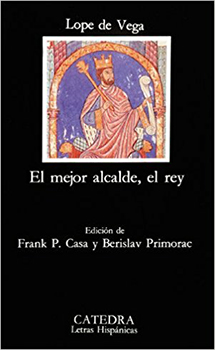The Best Mayor, The King
 El mejor alcalde, el rey is a play by the Spanish playwright Lope de Vega, written between 1620 and 1623 according to the dating proposed by Morley and Bruerton. It was published in 1635 in the twenty-first part of de Vega's comedies. The action occurs in early 12th century Galicia during the reign of Alfonso VII.
El mejor alcalde, el rey is a play by the Spanish playwright Lope de Vega, written between 1620 and 1623 according to the dating proposed by Morley and Bruerton. It was published in 1635 in the twenty-first part of de Vega's comedies. The action occurs in early 12th century Galicia during the reign of Alfonso VII.
Sancho de Roelas, a nobleman who has fallen on hard times, announces to his lord Tello de Neira his intention to marry Elvira de Olite, also of impoverished noble lineage. Don Tello offers to be best man at the wedding but on seeing Elvira falls in love with her beauty and kidnaps her. She refuses to have sex with him and Sancho travels to Leon to get Alfonso's help. Alfonso finally comes to Tello's manor-house incognito and – after revealing his identity and finding out that Tello has raped Elvira – forces him to marry Elvira. He then executes Tello, restoring Elvira's honour and endowing her with half Tello's estate.
It is from the 'villano honrado' (honest villain) genre, which involves a peasant fighting the abuses of a nobleman and the king finally giving him justice, restoring his honour and punishing the nobleman with death. In this play, the villain is Sancho de Roelas and the nobleman is Don Tello or Tello de Neira, who abducts and rapes Sancho's fiancee. It is also a historical drama since (as one character states at the end of the play) it is based on an anecdote told in Florián de Ocampo's Crónica de España, which was in de Vega's time considered as an edition of the Estoria de España.
Summary
Sancho, a poor peasant, is in love with an equally poor girl, Elvira, the daughter of a farmer named Nuno. When the old man gives Sancho permission to wed his daughter, he insists that Sancho also secure the consent of Don Tello, master of all the surrounding lands, and of Don Tello’s sister, Feliciana. In obedience to Nuno, Sancho goes with Pelayo, a swineherd, to the castle to ask his lord’s approval of the marriage. Both Don Tello and his sister Feliciana readily give their consent and their blessing, and they declare that they themselves will attend the wedding.
When Don Tello sees the beautiful Elvira, however, he is filled with such passion for her that he decides to postpone the wedding and take Elvira to satisfy his own lust before giving her to Sancho for his wife. Dismissing the priest, he tells the assembled guests that the wedding must wait until the next day. Sancho and Elvira feels themselves already married, however, since the priest heard them declare their true love for each other, and Sancho plans to go to Elvira’s room that night. When Elvira opens her door, she confronts not her lover but Don Tello and his attendants, all masked, who carry her off to the castle.
Sancho and Nuno, learning of this betrayal, are ready to die. Nuno cautions Sancho not to despair, however, for he knows his daughter will die rather than lose her honor. Nuno knows his daughter well. Although Don Tello pleads with her and threatens her, she will not give herself to him. Feliciana begs him to remember his good name and his honor and not to force the girl.
Sancho and Nuno, going to Don Tello, pretend that they hear but cannot believe that he stole Elvira away. Don Tello pretends also that he is outraged at such a story and would whip those who tell such lies to defame his honor. However, when Elvira enters the room, Don Tello flies into a rage and orders Sancho and Nuno beaten to death. They flee for their lives. Don Tello vows that he will force Elvira to submit to him or be killed. Again Sancho wants to die, but once more Nuno persuades him that there is still hope. He sends Sancho and Pelayo to the court of Alfonso, the king of Castile, for the king is a good man and well known for his justice...

